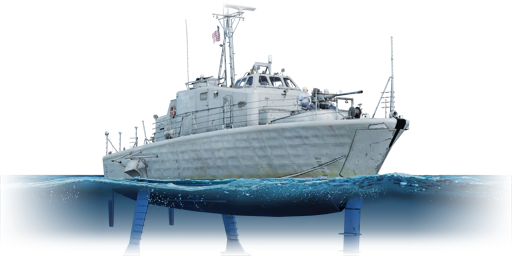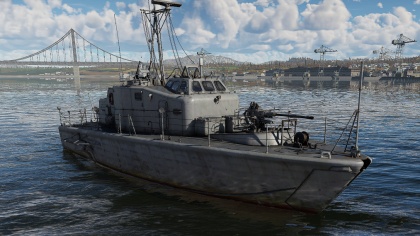Difference between revisions of "USS Tucumcari"
(→Media: Added Shooting Range episode) |
(Added survivability.) (Tag: Visual edit) |
||
| Line 9: | Line 9: | ||
== General info == | == General info == | ||
=== Survivability and armour === | === Survivability and armour === | ||
| − | + | The PGH-2 lacks any armor, and the ammunition for the 40mm Bofors gun can be seen on deck, not to mention that they aren't armored, so they can be hit easily. | |
| + | |||
| + | The gunners are all exposed, so be careful not to let them get hit. | ||
''If necessary, use a graphic template to show the most well-protected or most vulnerable points in the armour.'' | ''If necessary, use a graphic template to show the most well-protected or most vulnerable points in the armour.'' | ||
Revision as of 14:35, 2 June 2020
Contents
Description
The USS Tucumcari (PGH-2) is a rank American motor gun boat
with a battle rating of (AB), (RB), and (SB). It was introduced in Update 1.79 "Project X" as part of the fleet closed beta test.
General info
Survivability and armour
The PGH-2 lacks any armor, and the ammunition for the 40mm Bofors gun can be seen on deck, not to mention that they aren't armored, so they can be hit easily.
The gunners are all exposed, so be careful not to let them get hit.
If necessary, use a graphic template to show the most well-protected or most vulnerable points in the armour.
Mobility
Write about the ship’s mobility. Evaluate its power and manoeuvrability, rudder rerouting speed, stopping speed at full tilt, with its maximum forward speed and reverse speed.
Armament
Primary armament
Provide information about the characteristics of the primary armament. Evaluate their efficacy in battle based on their reload speed, ballistics and the capacity of their shells.
Broadly describe the ammunition available for the primary armament, and provide recommendations on how to use it and which ammunition to choose.
Secondary armament
Some ships are fitted with weapons of various calibres. Secondary armament is defined by the weapon chosen with the control Select secondary weapon. Evaluate the secondary armament and give advice on how to use them. Describe the ammunition available for the secondary armament. Provide recommendations on how to use them and which ammunition to choose. Remember that anti-air armament, even heavy calibre weapons, belong in the next section.
Anti-aircraft armament
An important part of the ship’s armament responsible for air raid defence. Anti-aircraft armament is defined by the weapon chosen with the control Select anti-aircraft weapons. Talk about the ship’s anti-air cannons and machine guns, the number of guns and their positions, their effective range, and about their overall effectiveness – including against surface targets.
Usage in battles
Describe the technique of using this ship, the characteristics of her use in a team and tips on strategy. Abstain from writing an entire guide – don’t get try to provide a single point of view, but give the reader food for thought. Talk about the most dangerous opponents for this vehicle and provide recommendations on fighting them. If necessary, note the specifics of playing with this vehicle in various modes (AB, RB, SB).
Modules
| Tier | Seakeeping | Unsinkability | Firepower | |||
|---|---|---|---|---|---|---|
| I | Dry-Docking | Tool Set | 40 mm HE clips | .50 AP belt | Anti-Air Armament Targeting | |
| II | Rudder Replacement | Fire Protection System | 40 mm AP clips | .50 APIT belt | ||
| III | Propeller Replacement | Primary Armament Targeting | ||||
| IV | Engine Maintenance | New Pumps | Smokescreen | Artillery Support | ||
Pros and cons
Pros:
- Good top speed overall
- Has a powerful 40 mm gun
- Good manoeuvrability
Cons:
- Overall armament is rather light
- When at top speed, the bottom of the hull is exposed, due to the whole ship riding above the water, save the hydrofoil attachments
- Very light anti-aircraft armament, allowing planes to get really close to her before dropping their ordnance
History
The USS Tucumcari, named after the city in New Mexico, was a hydrofoil boat developed by the Boeing company in the late 1960s to test a decade’s worth of hydrofoil research and development. She was a true state-of-the-art ship, sporting the latest in hydrofoil technology, electronics and a powerful gas turbine engine. All of this granted the ship an excellent top speed and maneuverability, whilst also allowing it to seamlessly traverse even rough waters. USS Tucumcari was delivered and commissioned to the U.S. Navy in March 1968.
In her early service life, Tucumcari was thoroughly tested in the Pacific waters off the American west coast, performing various patrol missions and taking part in fleet exercises. Following this, the ship was sent on its first combat missions to Vietnam, taking part in Operation Market Time. There, Tucumcari managed to successfully prove her effectiveness in combat conditions with positive remarks on her performance.
After her return to the United States in 1970, she was transferred to the Atlantic Fleet before being sent off on a European demonstration tour in 1971. Throughout the tour, USS Tucumcari visited several European (NATO) countries including Denmark, France, Germany, Italy, Britain, Greece and Turkey, in an effort to demonstrate the capability of hydrofoil propulsion to other NATO members.
USS Tucumcari returned to the States once more in October 1971 and resumed with, among others, coastal patrol duties with the U.S. Coast Guard. In November 1972 however, the ship was severely damaged after running aground on a coral reef at full speed during a simulated combat mission off the coast of Puerto Rico. Due to the excessive damage, it was deemed uneconomical to recover and repair the ship. Thus, USS Tucumcari was struck off the Naval Register in November 1973 and was subsequently taken apart for scraps.
- From Devblog
Media
See also
Links to the articles on the War Thunder Wiki that you think will be useful for the reader, for example:
- reference to the series of the ship;
- links to approximate analogues of other nations and research trees.
External links
| USA boats | |
|---|---|
| Motor torpedo boats | PT-3 · PT-6 · PT-20 · PT-71 · PT-103 · PT-109 · PT-174 |
| PT-200 · PT-314 · Thunderbolt (PT-556) · PT-565 · PT-658 · PT-810 · PT-811 · PT-812 | |
| Motor gun boats | Kim Qui · LCS(L)(3) · PT-59 · PTF-7 · USS Candid · USS Asheville · USS Douglas · USS Flagstaff · USS Tucumcari · USS Cyclone |
| Armoured gun boats | LCM(6) Zippo |





